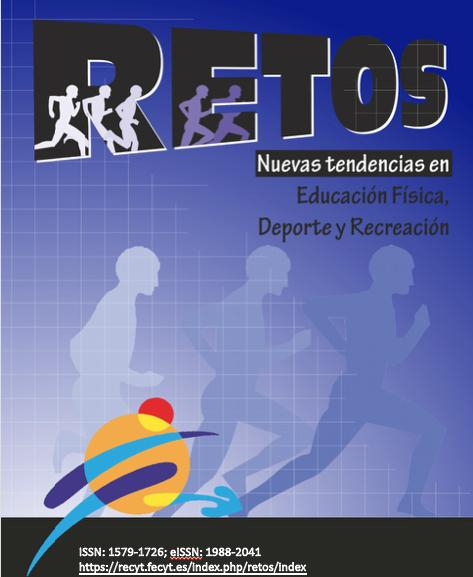Evolución de los efectos positivos y negativos en estudiantes que participan en actividades recreativas universitarias
DOI:
https://doi.org/10.47197/retos.v69.115937Palabras clave:
Actividades recreativas, bienestar estudiantil, dimensiones emocionales, inclusión universitaria, rendimiento académicoResumen
Introducción: La participación en actividades recreativas ha sido reconocida como un factor relevante en el bienestar integral del estudiante universitario, incidiendo en aspectos emocionales, sociales y académicos. Este estudio abordó dicha problemática desde una perspectiva comparativa en diversas universidades de Ecuador.
Objetivo: valorar cómo la participación en actividades recreativas se relaciona con aspectos emocionales, sociales y académicos de estudiantes de primer ingreso en diversas universidades de Ecuador.
Metodología: Se aplicó un enfoque cuantitativo con diseño no experimental, de tipo transversal y correlacional. La muestra estuvo compuesta por estudiantes de primer ingreso de distintas universidades ecuatorianas. Se utilizaron cuestionarios con escala Likert, y los datos fueron procesados mediante estadísticos descriptivos, correlación de Pearson y prueba t de Student para muestras independientes.
Resultados: Los estudiantes que participaban con mayor frecuencia en actividades recreativas percibieron mayores beneficios emocionales, sociales y académicos. Se identificaron diferencias estadísticamente significativas según género, universidad de procedencia y tipo de actividad realizada.
Discusión: Los hallazgos coincidieron con investigaciones previas que destacan la influencia de la actividad recreativa en la reducción del estrés, el fortalecimiento de las relaciones interpersonales y el aumento del compromiso académico.
Conclusiones: Se concluyó que la recreación universitaria representa una herramienta clave para favorecer el desarrollo integral de los estudiantes. Su implementación planificada y contextualizada puede generar efectos duraderos en su trayectoria académica y personal.
Referencias
Asto, G., y Herrera, A. (2024). Estrés académico y actividad física en estudiantes universitarios - UNSCH, Ayacucho 2024. [Tesis de pregrado, Universidad Nacional de San Cristóbal de Huamanga]
Azard, O., & Correa, A. L. (2021). Relación entre la actividad física y el rendimiento intelectual de los estudiantes universitarios. Anuario De Investigación UM, 2(2), 233-266. http://anuarioinvestigacion.um.edu.mx/index.php/anuarioium/article/view/205
Benítez, V. B., Realpe, D. de L., Simaleza, A. C., & Salguero, R. X. (2023). La actividad física y la calidad de vida de los estudiantes universitarios ecuatorianos. Ciencia Y Educación, 4(3), 21 - 30. https://www.cienciayeducacion.com/index.php/journal/article/view/189
Castellanos, Y., & López, J. F. (2023). Inclusión Universitaria: Perspectiva desde la Actividad Física y el Deporte. Revista Salud, Historia Y Sanidad, 18(1), 18–25. https://doi.org/10.5281/zenodo.13958743
Charchabal, D., Valverde, L. R., Macao, K. N., & Valverde, L. V. (2018). La recreación y su impacto en el sedentarismo en los estudiantes universitarios (Revisión). Revista científica Olimpia, 15(48) https://dialnet.unirioja.es/servlet/articulo?codigo=6399859
Colque, O. A. (2023). Actividades recreativas y desarrollo integral en universitarios latinoamericanos. Desafíos, 14(2), 131–140. https://doi.org/10.37711/desafios.2023.14.2.398
Creswell, J. W. (2021). Diseño de investigación: Enfoques cualitativo, cuantitativo y mixto (6.ª ed.). Pearson Educación.
Delgado, K. (2021). Estrés y adaptación a la vida universitaria en estudiantes de enfermería de la Uni-versidad Nacional de Cajamarca filial - Jaén, 2021. [Tesis de pregrado, Universidad Nacional de Cajamarca] Recuperado de: http://190.116.36.86/bitstream/handle/20.500.14074/4923/TESIS%20-%20BACH.%20KEILA%20TERESA%20DELGADO%20S%c3%81NCHEZ.pdf?sequence=1&isAllowed=y
Hernández, R., Fernández, C., & Baptista, P. (2014). Metodología de la investigación (7.ª ed.). McGraw-Hill Education.
Iraizoz, A. M., García, V., León, G., & Brito, G. (2023). Actividad física en estudiantes universitarios: papel mediador frente al estrés académico y motivación para realizarla. Revista científica Olimpia, 20(4). https://www.researchgate.net/publication/374583576_Actividad_fisica_en_estudiantes_universitarios_papel_mediador_frente_al_estres_academico_y_motivacion_para_realizarla
Malla, A. L. (2023). Actividad física y su influencia en el rendimiento académico de estudiantes universi-tarios. Revisión sistemática. MENTOR revista de investigación educativa y deportiva, 2(5). https://revistamentor.ec/index.php/mentor/article/view/5694
Masaquiza, A. (2025). Actividades ludo recreativas en la autoestima de los estudiantes educación gene-ral básica elemental. [Tesis de Pregrado, Universidad Técnica de Ambato] Recuperado de: https://repositorio.uta.edu.ec/server/api/core/bitstreams/08fc417b-a5f5-498f-a23a-c2512b9a422b/content
Reyes, W., & Pérez, A. (2022). Gustos y Preferencias en la Recreación Cultural de los estudiantes en la comunidad de la Universidad de Oriente: Array. Maestro Y Sociedad, 19(1), 278–292. https://maestroysociedad.uo.edu.cu/index.php/MyS/article/view/5498
Romero, O. P., Ortega, M. V., Perlaza, A. A., & Romero, F. E. (2024). Promoción de la Actividad Física, Recreativa y Deportiva en la Comunidad Universitaria UG. Revista Científica Arbitrada De In-vestigación En Comunicación, Marketing Y Empresa REICOMUNICAR, 7(13 Ed. esp.), 97-111. https://www.reicomunicar.org/index.php/reicomunicar/article/view/227
Yepez, E. R., & Ola, D. G. (2023). Recreación y estrés en estudiantes universitarios. Revista Científica de Ciencias Humanas y Sociales RECIHYS, 1(2). https://journal.espe.edu.ec/ojs/index.php/RECIHYS/article/view/3234
Descargas
Publicado
Número
Sección
Licencia
Derechos de autor 2025 Sara Nila Yagual Rivera, Edgar Fabian Cobos Alvarado, Wilson Alexander Zambrano Vélez

Esta obra está bajo una licencia internacional Creative Commons Atribución-NoComercial-SinDerivadas 4.0.
Los autores que publican en esta revista están de acuerdo con los siguientes términos:
- Los autores conservan los derechos de autor y garantizan a la revista el derecho de ser la primera publicación de su obra, el cuál estará simultáneamente sujeto a la licencia de reconocimiento de Creative Commons que permite a terceros compartir la obra siempre que se indique su autor y su primera publicación esta revista.
- Los autores pueden establecer por separado acuerdos adicionales para la distribución no exclusiva de la versión de la obra publicada en la revista (por ejemplo, situarlo en un repositorio institucional o publicarlo en un libro), con un reconocimiento de su publicación inicial en esta revista.
- Se permite y se anima a los autores a difundir sus trabajos electrónicamente (por ejemplo, en repositorios institucionales o en su propio sitio web) antes y durante el proceso de envío, ya que puede dar lugar a intercambios productivos, así como a una citación más temprana y mayor de los trabajos publicados (Véase The Effect of Open Access) (en inglés).
Esta revista sigue la "open access policy" de BOAI (1), apoyando los derechos de los usuarios a "leer, descargar, copiar, distribuir, imprimir, buscar o enlazar los textos completos de los artículos".
(1) http://legacy.earlham.edu/~peters/fos/boaifaq.htm#openaccess


